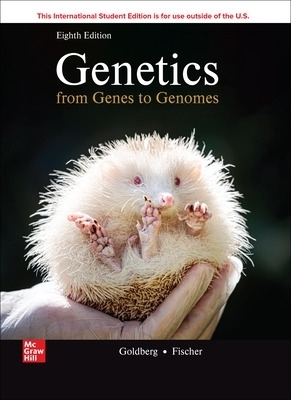
Genetics: From Genes To Genomes ISE
McGraw-Hill Education (Verlag)
978-1-266-24667-8 (ISBN)
Dr. Michael Goldberg is a professor at Cornell University, where he teaches introductorygenetics and human genetics. He was an undergraduate at Yale Universityand received his Ph.D. in biochemistry from Stanford University. Dr. Goldberg performedpostdoctoral research at the Biozentrum of the University of Basel (Switzerland)and at Harvard University, and he received an NIH Fogarty Senior InternationalFellowship for study at Imperial College (England) and fellowships from theFondazione Cenci Bolognetti for sabbatical work at the University of Rome (Italy).His current research uses the tools of Drosophila genetics and the biochemical analysisof frog egg cell extracts to investigate the mechanisms that ensure proper cellcycle progression and chromosome segregation during mitosis and meiosis. Dr. Janice Fischer is a Professor at The University of Texas at Austin, where she is an award-winning teacher of genetics and Director of the Biology Instructional Office. She received her Ph.D. in biochemistry and molecular biology from Harvard University, and did postdoctoral research at The University of California at Berkeley and The Whitehead Institute at MIT. In her current research, Dr. Fischer uses Drosophila to examine the roles of ubiquitin and endocytosis in cell signaling during development. Dr. Hood received an MD from the Johns Hopkins Medical Schooland a PhD in Biochemistry from the California Institute of Technology. His research interests include immunology, development and the development of biological instrumentation (e.g. the protein sequenator and the automated fluorescent DNA sequencer). His research played a key role in unraveling the mysteries of anitbody diversity. Dr. Hood has taught molecular evolution, immunology, molecular biology and biochemistry. he is currently the Chairman (and founder) of the cross-disciplinary Department of Molecular Biotechnology at the University of Washington. Dr. Hood has received a variety of awards including the Albert Lasker Award for Medical Research (1987), Dickson Price (1987), Cefas Award for Biochemistry (1989), and the Distinguished Service Award from the national Association of Teachers (1998). He is deeply involved in K-12 science educatiohn. His hobbies include running, mountain climbing, and reading. Dr. Leland Hartwell is President and Director of Seattle’s Fred Hutchinson CancerResearch Center and Professor of Genome Sciences at the University of Washington.Dr. Hartwell’s primary research contributions were in identifying genes that controlcell division in yeast, including those necessary for the division process as well asthose necessary for the fi delity of genome reproduction. Subsequently, many of thesesame genes have been found to control cell division in humans and oft en to be thesite of alteration in cancer cells.Dr. Hartwell is a member of the National Academy of Sciences and has receivedthe Albert Lasker Basic Medical Research Award, the Gairdner FoundationInternational Award, the Genetics Society Medal, and the 2001 Nobel Prize inPhysiology or Medicine. Dr. Charles Aquadro (Chip) is Professor of Population Genetics, the Charles A. Alexander Professor of Biological Sciences, and Director of the Center for Comparative and Population Genomics at Cornell University. He obtained his Ph.D. in genetics from the University of Georgia, was a postdoc at the National Institute for Environmental Health Sciences/NIH, and joined the faculty at Cornell University in 1985 where he is now a professor. He has served as President of the Society of Molecular Biology and Evolution, is an elected Fellow of the AAAS, is a member of the Scientific Advisory Board for National Geographic Societys Genographic Project, was a member of the Scientific Advisory Board for the WGBH/NOVA TV series Evolution, and has been a visiting scholar at Cambridge University (England, 1993) and Harvard University (2007). His research and teaching focuses on molecular population genetics, molecular evolution, and comparative genomics. While Drosophila is his primary research system, recent work has also involved yeast, humans, and plants. At Cornell, he teaches a university-wide course to nonmajors on personal genomics and medicine, and a majors course in population genetics.
PART I Basic Principles: How Traits Are Transmitted
1 Mendel’s Principles of Heredity
2 Extensions to Mendel’s Laws
3 Chromosomes and Inheritance
4 Sex Chromosomes
5 Linkage, Recombination, and Gene Mapping
PART II What Genes Are and What They Do
6 DNA Structure, Replication, and Recombination
7 Mutation
8 Using Mutations to Study Genes
9 Gene Expression: The Flow of Information from DNA to RNA to Protein
PART III Analysis of Genetic Information
10 Digital Analysis of DNA
11 Genome Annotation
12 Analyzing Genomic Variation
PART IV How Genes Travel on Chromosomes
13 The Eukaryotic Chromosome
14 Chromosomal Rearrangements
15 Ploidy
16 Bacterial Genetics
17 Organellar Inheritance
PART V How Genes Are Regulated
18 Gene Regulation in Prokaryotes
19 Gene Regulation in Eukaryotes
20 Epigenetics
PART VI Using Genetics
21 Manipulating the Genomes of Eukaryotes
22 Genetic Analysis of Development
23 The Genetics of Cancer
PART VII Beyond the Individual Gene and Genome
24 Variation and Selection in Populations
25 Genetic Analysis of Complex Traits
| Erscheinungsdatum | 18.10.2023 |
|---|---|
| Zusatzinfo | 641 Illustrations |
| Verlagsort | OH |
| Sprache | englisch |
| Gewicht | 1599 g |
| Themenwelt | Medizin / Pharmazie ► Allgemeines / Lexika |
| Naturwissenschaften ► Biologie ► Genetik / Molekularbiologie | |
| ISBN-10 | 1-266-24667-3 / 1266246673 |
| ISBN-13 | 978-1-266-24667-8 / 9781266246678 |
| Zustand | Neuware |
| Informationen gemäß Produktsicherheitsverordnung (GPSR) | |
| Haben Sie eine Frage zum Produkt? |
aus dem Bereich


